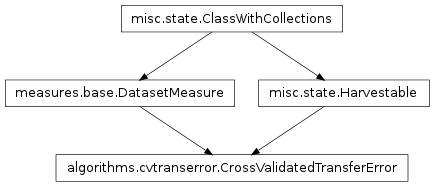This content refers to the previous stable release of PyMVPA.
Please visit
www.pymvpa.org for the most
recent version of PyMVPA and its documentation.
algorithms.cvtranserror
Module: algorithms.cvtranserror
Inheritance diagram for mvpa.algorithms.cvtranserror:

Cross-validate a classifier on a dataset
-
class mvpa.algorithms.cvtranserror.CrossValidatedTransferError(transerror, splitter=None, combiner='mean', expose_testdataset=False, harvest_attribs=None, copy_attribs='copy', **kwargs)
Bases: mvpa.measures.base.DatasetMeasure, mvpa.misc.state.Harvestable
Classifier cross-validation.
This class provides a simple interface to cross-validate a classifier
on datasets generated by a splitter from a single source dataset.
Arbitrary performance/error values can be computed by specifying an error
function (used to compute an error value for each cross-validation fold)
and a combiner function that aggregates all computed error values across
cross-validation folds.
Note
Available state variables:
confusion: Store total confusion matrix (if available)
harvested: Store specified attributes of classifiers at each split
null_prob+: State variable
null_t: State variable
raw_results: Computed results before applying any transformation algorithm
results: Store individual results in the state
samples_error: Per sample errors.
splits: Store the actual splits of the data. Can be memory expensive
training_confusion: Store total training confusion matrix (if available)
- transerrors: Store copies of transerrors at each step. If enabled -
operates on clones of transerror, but for the last split original
transerror is used
(States enabled by default are listed with +)
| Parameters: |
- transerror (TransferError instance) – Provides the classifier used for cross-validation.
- splitter (Splitter | None) – Used to split the dataset for cross-validation folds. By
convention the first dataset in the tuple returned by the
splitter is used to train the provided classifier. If the
first element is ‘None’ no training is performed. The second
dataset is used to generate predictions with the (trained)
classifier. If None (default) an instance of
NoneSplitter is used.
- combiner (Functor | ‘mean’) – Used to aggregate the error values of all cross-validation
folds. If ‘mean’ (default) the grand mean of the transfer
errors is computed.
- expose_testdataset (bool) – In the proper pipeline, classifier must not know anything
about testing data, but in some cases it might lead only
to marginal harm, thus migth wanted to be enabled (provide
testdataset for RFE to determine stopping point).
- harvest_attribs (list of basestr) – What attributes of call to store and return within
harvested state variable
- copy_attribs (None | basestr) – Force copying values of attributes on harvesting
- enable_states (None or list of basestring) – Names of the state variables which should be enabled additionally
to default ones
- disable_states (None or list of basestring) – Names of the state variables which should be disabled
- transformer (Functor) – This functor is called in __call__() to perform a final
processing step on the to be returned dataset measure. If None,
nothing is called
- null_dist (instance of distribution estimator) – The estimated distribution is used to assign a probability for a
certain value of the computed measure.
|
|---|
-
combiner
Access to the configured combiner.
-
splitter
Access to the Splitter instance.
-
transerror
Access to the TransferError instance.


